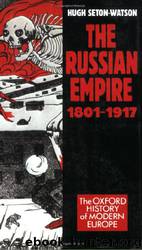The Russian Empire 1801-1917 by Hugh Seton-watson

Author:Hugh Seton-watson [Seton-watson, Hugh]
Language: eng
Format: epub
ISBN: 9780198221524
Amazon: 0198221525
Publisher: Oxford University Press, USA
Published: 1988-03-31T04:00:00+00:00
government to do anything to instruct the peasants in methods of cultivation. If they stuck to antiquated systems of crop rotation, this was only because they had no reason to believe that better systems existed. It was all very well to have a few model farms with the very best modern machinery and methods to stress the possibilities of the latest agricultural science. But these machines and this knowledge were quite inaccessible to the peasants. The authorities would do better to spend money and effort on teaching the peasants the many cheap and practical improvements they could introduce, on providing them with greatly superior yet not very complicated instruments, on studying the particular needs of different localities, on producing small handbooks of useful knowledge, which could be read out by the literate minority to the illiterate majority, and above all on increasing elementary education.
These arguments of Kavelin are all the more convincing in the light of the experience of another country that at this time embarked on modernization, Japan. The Japanese reformers did precisely what Kavelin had recommended. They took heavy taxes from the peasants, but they put a large part of their revenue back into agriculture, and in a few decades doubled the output per acre. The peasants were encouraged to devise practical tools and labour-saving devices of their own, suited to their needs. Above all the Japanese government introduced within a few decades a system of compulsory elementary education for both sexes. In Russia, however, an attitude of distrustful, if occasionally benevolent, paternalism prevailed. The peasants must indeed be protected from the horrors of proletarization. But it was unwise to impose on them any modern education, which would give them dangerous ideas. The new ideas and new techniques were for the upper classes only. The peasants' task was to pay for industrialization, by taxes both direct and indirect. The commune was an admirable instrument of political power. As for economic improvements in agriculture, they were excellent where a great landowner had the wealth and the enterprise to experiment, but as far as the peasant masses were concerned they had not a high priority. This mentality persisted for fifty years, and helped to destroy Imperial Russia.
In 1877 (when perhaps four-fifths of the peasant allotments
-403-
Download
This site does not store any files on its server. We only index and link to content provided by other sites. Please contact the content providers to delete copyright contents if any and email us, we'll remove relevant links or contents immediately.
| Africa | Americas |
| Arctic & Antarctica | Asia |
| Australia & Oceania | Europe |
| Middle East | Russia |
| United States | World |
| Ancient Civilizations | Military |
| Historical Study & Educational Resources |
Red Famine: Stalin's War on Ukraine by Anne Applebaum(2929)
Midnight in Chernobyl by Adam Higginbotham(2541)
Chernobyl by Serhii Plokhy(2535)
Midnight in Chernobyl: The Untold Story of the World's Greatest Nuclear Disaster by Adam Higginbotham(2226)
The House of Government by Slezkine Yuri(2200)
Red Shambhala by Andrei Znamenski(2193)
The Gulag Archipelago (Vintage Classics) by Aleksandr Solzhenitsyn(2096)
Red Notice by Bill Browder(2070)
All the Kremlin's Men by Mikhail Zygar(2064)
From Cold War to Hot Peace by Michael McFaul(2029)
Putin's Labyrinth(2016)
From Russia with Lunch by David Smiedt(1971)
The Future Is History by Masha Gessen(1904)
A People's Tragedy by Orlando Figes(1864)
The Romanovs by Simon Sebag Montefiore(1820)
How to Tame a Fox (and Build a Dog): Visionary Scientists and a Siberian Tale of Jump-Started Evolution by Lee Alan Dugatkin & Lyudmila Trut(1770)
Putin's Labyrinth: Spies, Murder, and the Dark Heart of the New Russia(1752)
The Lost Spy by Andrew Meier(1745)
Art and Revolution by John Berger(1721)
